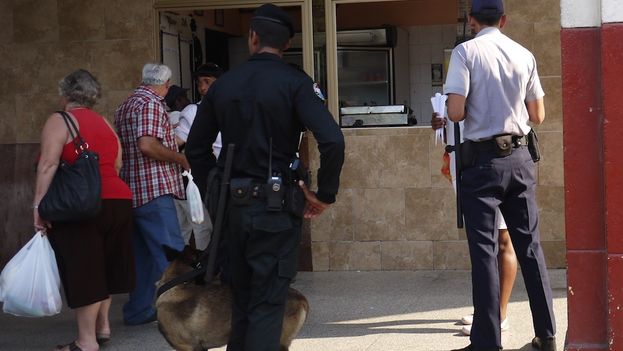
![]() 14ymedio, Orlando Palma, Havana, 29 August 2015 – Outside the market at 17th and K in Havana informal vendors gather despite the police raids. Niurka is one of them and her “offering” is reduced to selling plastic bags which she offers at one Cuban peso (about 4¢ US) each. “The last time they charged me, they gave me a one thousand peso fine,” says the women about her most recent encounter. However, she says she wouldn’t think of paying it and will continue to offer her wares.
14ymedio, Orlando Palma, Havana, 29 August 2015 – Outside the market at 17th and K in Havana informal vendors gather despite the police raids. Niurka is one of them and her “offering” is reduced to selling plastic bags which she offers at one Cuban peso (about 4¢ US) each. “The last time they charged me, they gave me a one thousand peso fine,” says the women about her most recent encounter. However, she says she wouldn’t think of paying it and will continue to offer her wares.
“People come here when they are planning to travel or to do some paperwork and they don’t want to have an unpaid fine,” says an employee of the Fine Payment Office of the Plaza of the Revolution municipality. In line for the payment counter, a young man named Diego carried in his hand a paper that shows the amounts for each offense. “I was sitting on a wall and a cop fined me for damage to a public ornament,” he says angrily.
“I was sitting on a wall and a cop fined me for damage to a public ornament,” he says angrily
When asked if from now on he would avoid sitting there, Diego made a defiant noise with his mouth that is popularly known as “frying an egg.” Several people in the line laughed with complicity. Those who have come there are only a part of those fined, the rest will wait until the last moment to pay their debt, or never pay it at all.
The amount of fines accumulated in the capital are not the only in the country that are high. According to the local press in Ciego de Avila, the debts to the public purse, as of the end of July, consisted of 21,600 fines totalling more than 4,473,000 pesos, still unpaid in this province. Some 90% of them are “in arrears,” that is doubled 30 days after their imposition.
The lack of collection managers to go to the homes of those in default is one of the reasons that slows down the whole process. “Before, many came and paid so that their neighbors wouldn’t see that they had been fined,” explains an employee Department of Penalties of the Provincial Department of Finance and Prices in Havana, who asked for anonymity.
The opinion of those fined is very different from the official version. Eduardo, a traveling sweets seller who works primarily in the Cerro municipality, near the corner of Infanta and Manglar, believes that “sometimes they issue fines just because they feel like it.” The self-employed man says, “They’ve penalized me for standing in one place for a few minutes while selling my products.”
Many collection managers have a system of paying for results. This means that the more fines they issue they more they earn.
Many collection managers have a system of paying for results. This means that the more fines they issue they more they earn. “At the end of the month you see them acting like crazy people trying to collect all the accumulated fines,” explains Samuel, a collective taxi driver who plies the route from Fraternity Park to Santiago de las Vegas.
The payment system is plagued with bureaucratic deficiencies and excesses, as 14ymedio was able to confirm. If a cop or an inspector imposes a fine in Havana on a citizen whose identity card shows their residence in another province, the violation will be settled in the municipality of origin. It will be a headache for this office to locate the offender and make them pay.
“I must have a fortune in fines in Sagua de Tanamo, so it’s been years since I visited my family,” confesses the illegal driver of an almendrón (a shared, fixed-route taxi). However, none of the respondents for this article have had their wages seized as a consequence of not paying their debt to the public purse, nor has any been brought before a court or held in detention.
Fines grow. They are doubled and some reach unpayable figures, but it doesn’t seem to deter many from committing an offense. “The problem is that here everything is forbidden, so people have lost respect for the law,” blurts out Niurka. And she adds defiantly, “This week I will hide myself better, so that inspectors can not see me.”
